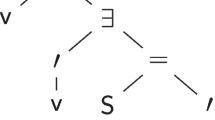Abstract
This paper propounds a systematic examination of the link between the Knower Paradox and provability interpretations of modal logic. The aim of the paper is threefold: to give a streamlined presentation of the Knower Paradox and related results; to clarify the notion of a syntactical treatment of modalities; finally, to discuss the kind of solution that modal provability logic provides to the Paradox. I discuss the respective strength of different versions of the Knower Paradox, both in the framework of first-order arithmetic and in that of modal logic with fixed point operators. It is shown that the notion of a syntactical treatment of modalities is ambiguous between a self-referential treatment and a metalinguistic treatment of modalities, and that these two notions are independent. I survey and compare the provability interpretations of modality respectively given by Skyrms, B. (1978, The Journal of Philosophy 75: 368–387) Anderson, C.A. (1983, The Journal of Philosophy 80: 338– 355) and Solovay, R. (1976, Israel Journal of Mathematics 25: 287–304). I examine how these interpretations enable us to bypass the limitations imposed by the Knower Paradox while preserving the laws of classical logic, each time by appeal to a distinct form of hierarchy.
Similar content being viewed by others
References
Anderson, C.A., 1983, “The Paradox of the Knower,” The Journal of Philosophy 80, 338–355.
Asher, N. and Kamp., H., 1989, “Self-reference, attitudes and paradox,” in Chierchia et al. (1989): 85–158.
Bicchieri, C. and Dalla Chiara, M.L., eds., 1992, Knowledge, Belief and Strategic Interaction, Cambridge: Cambridge University Press.
Binmore, K. and Shin, H.S., 1992, “Algorithmic knowledge and game theory,” in Bicchieri and Dalla Chiara, pp. 141–154.
Boolos, G., 1993, The Logic of Provability, New York, Cambridge Unversity Press.
Boolos, G. and Sambin, G., 1991, “Provability: The emergence of a mathematical modality,” Studia Logica 50, 1–23.
Chellas, B.F., 1980, Modal Logic: An Introduction, Cambridge: Cambridge University Press.
Chierchia, G., Partee, B. and Turner, R., eds., 1989, Properties, Types and Meaning, Vol. I, Foundational Issues, Dordrecht: Kluwer Academic Publisher, Studies in Linguistics and Philosophy.
Cross, C.B., 2001a, “The Paradox of the Knower without epistemic closure,” Mind 110, 319–333.
Cross, C.B., 2001b, “A theorem concerning syntactical treatments of non-idealized belief,” Synthese 129, 335–341.
Cross, C.B., 2004, “More on the Paradox of the Knower without epistemic closure,” Mind 113, 109–114.
Enderton, H.B., 1972, A Mathematical Introduction to Logic, San Diego, CA: Academic Press.
Feferman, S., 1962, “Transfinite recursive progressions of axiomatic theories,” Journal of Symbolic Logic 27, 259–316.
Field, H., 2002, “Saving the truth schema from paradox,” Journal of Philosophical Logic 31, 1–27.
Friedman, H. and Sheard, M., 1987, “An axiomatic approach to self-referential truth,” Annals of Pure and Applied Logic 33, 1–21.
Gödel, K., 1933, “Eine Interpretation des intuitionistischen Aussagenkalküls,” translated in, Collected Works,Vol. 1, K. Gödel, S. Feferman et al., eds., New York: Oxford University Press.
Henkin, L., 1952, “A problem concerning provability,” Journal of Symbolic Logic 17, 160.
Kaplan, D. and Montague, R., 1960, “A paradox regained,” Notre Dame Journal of Formal Logic 1, 79–90, repr. in Montague (1974), 271–85.
Koons, R., 1992, Paradoxes of Belief and Strategic Rationality, New York: Cambridge University Press.
Löb, M.H., 1955, “Solution of a problem of Leon Henkin,” Journal of Symbolic Logic 20, 115–118.
McGee, V., 1991, Truth, Vagueness and Paradox: An Essay on the Logic of Truth, Indianapolis: Hackett Publishing Company.
Montague, R., 1963, “Syntactical treatments of modality, with corollaries on reflexion principles and finite axiomatizability,” Acta Philosophica Fennica 16, 153–67, repr. in Montague (1974), 286–302.
Montague, R., 1974, Formal Philosophy Selected Papers of Richard Montague, edited and with an introduction by R.H. Thomason, New Haven, Yale University Press.
Perlis, D. and Subrahmanian, V., 1994, “Meta-languages, reflection principles and self-reference,” in Handbook of Logic in Artificial Intelligence and Logic Programming, Vol. II: Deduction Methodologies, D. Gabbay, C.J. Hogger and J.A. Robinson, eds., Oxford University Press, pp. 323–358.
Quine, W.V.O., 1940, Mathematical Logic, Revised Edn., Cambridge, MA: Harvard University Press, 1981.
Quine, W.V.O., 1953, “Three grades of modal involvement,” in The Ways of Paradox and Other Essays, Cambridge, MA: Harvard University Press, pp. 158–176.
Reinhardt, W.N., 1980, “Necessity predicates and operators,” Journal of Philosophical Logic 9, 437–450.
Reinhardt, W.N., 1986, “Epistemic theories and the interpretation of Gödel’s incompleteness theorems,” Journal of Philosophical Logic 15, 427–474.
Richard, M., 1990, Propositional Attitudes, An Essay on Thoughts and How We Ascribe Them, New York, Cambridge.
Skyrms, B., 1978, “An immaculate conception of modality, or how to confuse use and mention,” The Journal of Philosophy 75, 368–387.
Smoryński, C., 1985, Self-Reference and Modal Logic, New York: Springer Verlag.
Smoryński, C., 1991, “The development of self-reference: Löb’s theorem,” in Perspectives on the History of Mathematical Logic, T. Drucker, ed., Boston, MA: Birkhäuser, pp. 110–133.
Smullyan, R.M., 1986, “Logicians who reason about themselves,” in Reasoning About Knowledge, Proceedings of the TARK Conference, San Mateo, CA: Morgan Kaufman, pp. 341–352.
Smullyan, R.M., 1992, Gödel’s Incompleteness Theorems, Oxford Logic Guides 19, New York: Oxford University Press.
Solovay, R., 1976, “Provability interpretations of modal logic,” Israel Journal of Mathematics 25, 287–304.
Thomason, R., 1977, “Indirect discourse is not quotational,” The Monist 60, 340–354.
Thomason, R., 1980, “A note on syntactical treatments of modality,” Synthese 44, 391–395.
Turner, R., 1990, Truth and Modality for Knowledge Representation, Cambridge, MA: MIT Press.
Tymoczko, T., 1984, “An unsolved puzzle about knowledge,” Philosophical Quarterly 34, 437–458.
Uzquiano, G., 2004, “The Paradox of the Knower without epistemic closure?,” Mind 113, 95–107.
Author information
Authors and Affiliations
Rights and permissions
About this article
Cite this article
Égré, P. The Knower Paradox in the light of provability interpretations of modal logic. J Logic Lang Inf 14, 13–48 (2004). https://doi.org/10.1007/s10849-004-6406-y
Received:
Revised:
Issue Date:
DOI: https://doi.org/10.1007/s10849-004-6406-y



